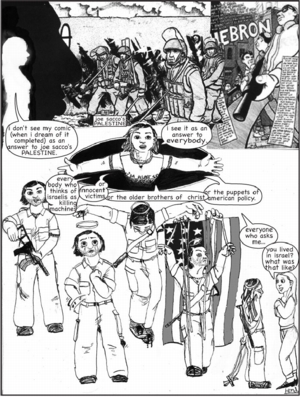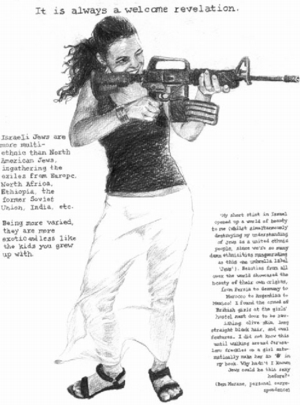 February 07
February 07
Jobnik!: A Good Jewish Girl Gone Better
Mordecai Drache
I lived in a neighborhood renowned for its ugliness and unlivability and worked with its children. It overpowered me sometimes though, how much I loved my group of six-year olds who couldn’t sit still and couldn’t understand my Hebrew half the time and how when I walked through the cats, litter, Russian grandparents and raggedy kids of the neighborhood, I felt at home. I also began to discover a love for Israel and its people… I realized that I couldn’t imagine living outside of Israel, that I belonged to the country and everyone in it.
So begins the first issue of Jobnik! , an extraordinary independent comic series by Miriam Libicki, relaying her experience as a Jewish-American girl from a devout Orthodox family who makes aliyah at the age of 17. Like most able-bodied Israeli citizens, she serves in the Israeli army. Diagnosed as “introverted and excessively emotional, as well as possessing poor Hebrew skills” by military psychologists, it is clear to everyone around her that she is not fit to be in the army. Still, she obtains a desk position as a secretary and file clerk for an infirmary at an Armored Corps training base in the Negev. Such positions are labeled derogatorily as the destiny of "Jobnikim" –pencil-pushing soldiers with desk jobs and other  non-essential positions. But rather than staying behind a desk, Miriam floats to a variety of departments, including the kitchen where some of her more disgusting tasks include scrubbing out a cauldron bigger than her and peeling mounds of vegetables outside of a garbage dumpster. In the process, readers learn very quickly what happens to a Diaspora Jew internally when Israel is no longer a vacation spot, but a home – a distant and beloved fantasy emerging as a complex, mundane, and at times violent reality.
non-essential positions. But rather than staying behind a desk, Miriam floats to a variety of departments, including the kitchen where some of her more disgusting tasks include scrubbing out a cauldron bigger than her and peeling mounds of vegetables outside of a garbage dumpster. In the process, readers learn very quickly what happens to a Diaspora Jew internally when Israel is no longer a vacation spot, but a home – a distant and beloved fantasy emerging as a complex, mundane, and at times violent reality.
Rather than focusing on grand political narratives such as the Israeli-Palestinian conflict, most of Miriam's story centers upon failed love affairs with men who seduce her into sex and dump her – Shahar, Asher, and Roi in rapid succession. The first two are soldiers on her base, the last a night watchman at a building near her sister’s apartment. Inevitably, she falls for each man quickly, fools around with him, and then cries with regret and shame when he tires of her soon after. While such an introduction might suggest that the cartoonist writing from an autobiographical perspective has produced self-absorbed fluff, rest assured that she has not. The complexities and challenges of Israeli life come out naturally with deep nuance in each of these interpersonal conflicts.
What makes Miriam such a likeable (though at times irritating) character – in a Bridget Jones sort of way – is her “flaw” of wearing her heart on her sleeve. She is extremely naïve; yet this is a naïveté borne out of a belief in the inherent good of people that maintains itself no matter how often she gets burned. This is an admirable quality, even if the reader occasionally shakes his or her head wondering how Miriam could let herself be fooled so easily. This perception is balanced by the knowledge that at her core there is nothing wrong with Miriam as a person. She is merely a gentle sort who has stumbled into a place where gentleness is not a practical quality.
From an Israeli perspective, however, Miriam's naïveté is the result of being raised in a different culture, one that hasn’t experienced war at its doorstep so often. For example, she begins dating Shahar during the period just prior the start of the Al-Aqsa Intifada in 2000. At the same time, Shahar takes a week off from Miriam in order to sleep with another woman whom he calls "a friend." When battles begin erupting across the occupied territories, he is sent to the front. She tries to call him but he refuses to answer his cell phone. Later, when Shahar more or less dumps Miriam, he uses the schism between native born-Israelis and new immigrants to belittle her. His rationalizations, though undoubtedly cruel, bespeak the differences in their cultural upbringings.
Miriam: I can’t deal with what’s happening. I’m freaking out.
Shahar: Oh, this? You wouldn’t be freaking out if you were
Israeli.
Miriam: I kept calling you ‘cause you said you were going to
to the territories! All I wanted to know is if you were alive!
Shahar: Somebody worrying me is exactly what I don’t need
right now. I do like you but I can’t be here for you.
Miriam: You can’t answer a pelephone. [Israeli slang for
cell-phone -Ed.]
Shahar: Miriam, I can’t. Do you understand?
Miriam: No.
Throughout the comic, more recent developments in the Israeli-Palestinian conflict offer an ever-present backdrop, making clear the very real brutalities that both sides commit. These range from the lynching of two Israeli reservists in Ramallah and the near murder of a British photographer who tried to capture it on film to the killing of 12-year-old Mohammed Aldura during crossfire between Israeli soldiers and Palestinians. What’s nice is that Libicki avoids avoid soap-box discussion, effectively keeping the comic from getting didactic or preachy, giving readers the message that she respects and trusts them to form their own opinions about the conflict.
"The Biggest Mofo of a Cookpot You Ever Seen"
In her narrative, art and composition play an important role. In issue three, for example, when Miriam and Asher are watching television and see the mangled corpse of the reservist being thrown outside a window in Ramallah, the words of the British photographer who witnesses the event and is nearly killed as well appear in white jagged squares – indicating in typical comic-book format that these words are being transmitted electronically:
Look how many years they’ve been talking peace –
since 1993. Then within just a couple of weeks, they
are at each other’s throats. It seems that it’s easier to
hate than forgive.
In the same issue, the reader finds Miriam sitting in the midst of 16 separate squares in which the news is presented from a newspaper article. Split into fours, Miriam is placed squarely in the middle of each set, looking more and more dejected as the words continue; still, there is no clear connection following one column to the next. This communicates what many people might experience when trying to track the peace process and its many failures. There comes a point in which the words of reportage and explanation blur and become incomprehensible. There are so many political twists and turns on both sides, it is impossible to keep up or understand the story.
As for the quality of the art as a whole, the first issue is not very strong. The pictures are flat and two-dimensional, a jagged zigzagged roughness running through Libicki's pen strokes and lack of texture that makes the comic unpleasing aesthetically. By the fifth issue there are radical improvements. Apparently trading her pen for a pencil and kneaded eraser, her later method allows for far smoother transitions from white to light grays to dark grays to black, making the overall effect smoother, more fluid, more subtle, and more three-dimensional. Backgrounds, as well, become more detailed.
The most interesting example of the artist's composition appears with a scene of Miriam cleaning “the biggest mofo of a cookpot you ever seen.” Crouching inside the pot in three different pictures bunched on top of one another with pipes as backdrop, the reader cannot help but empathize with Miriam’s sense of entrapment, compellingly communicated by the round metal cauldron walls surrounding her. As she scours the pot, she obsesses about Asher who has recently dumped her. The cauldron moves towards symbolizing her tendency to go in circles, repeating unhealthy actions again and again.

Arsim, Dosim, and Frechot
In the midst of all of this, gender issues play a very strong role. One can’t help but sense that the Israeli men who bed her have completely closed themselves emotionally. As a sheltered young woman raised in an American suburb, she does not have the skills to deal with Israeli men the way her female sabra counterparts might. This becomes especially clear when Miriam begins talking to Hila, who Asher has been trying to date while fooling around with her. Hila instigates a meeting between the three of them and digs right into Asher, saying bluntly, “You treated me and her exactly the same way!” After their meeting, while Miriam wallows in self pity, Hila, in direct no-nonsense Israeli fashion, sets her straight.










